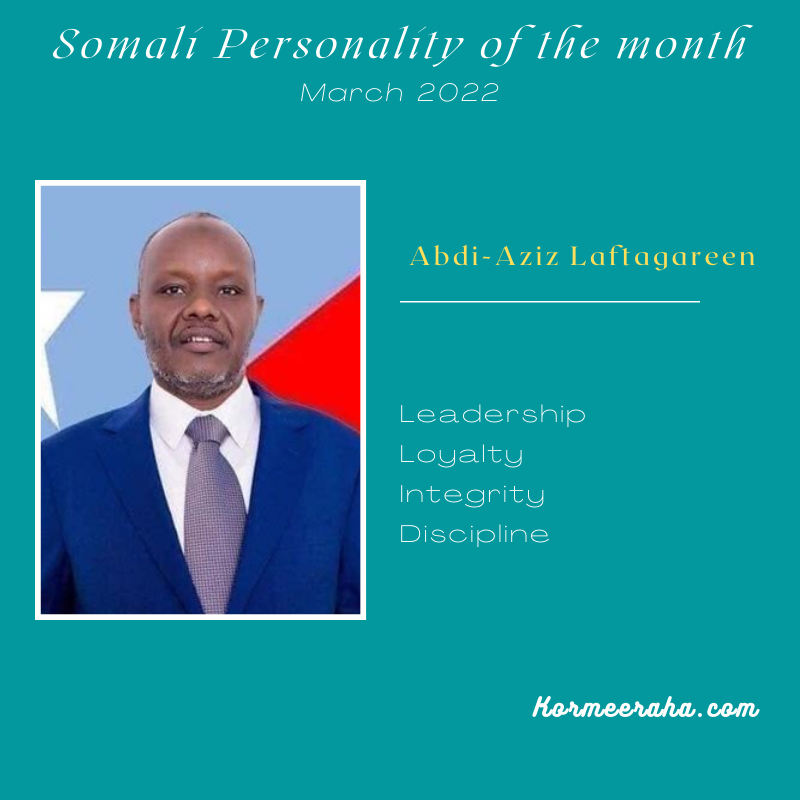
Kormeeraha Team has picked Abdi-Aziz Hassan Mohamed Laftagareen, Somalia’s Southwest State president, as the most outstanding Somali leader for the month of March.
Last month, President Laftagareen was the first president of a regional state to finish Somalia’s elections on time. He did it without requesting special accommodation or delays.
Southwest’s members of parliament election took place without violence or quarrels, and in accordance with the electoral agreements. The region has the highest number of constituencies, a total of 77.
In comparison, there was a bloodbath in Galmudug, Puntland and Hirshabelle. For their part, Jubaland and Hirshabelle are still struggling finalize their elections, after so many deadlines. Puntland and Jubaland violated almost all electoral agreements.
Laftagareen has demonstrated that he is a skilled administrator, a seasoned speaker and a mediator who has brought order to his region.
Coming from a previously marginalized community, Laftagareen demonstrated that his community is more than an arbiter in federal politics. Indeed, in Mogadishu’s polarized politics, two clans in perpetual conflict pass the buck to the chagrin of the Somali people.
This last decade has shown that a turbulent Somalia needs the pacifism, the nationalist fervor, the discipline of this southern community.
Dispossessed of their land, the most fertile in Somalia, they bowed down and been humiliated for a very long time. Very active in the anti-colonial struggle, the diverse but cohesive populations of the Southwest were alienated from power once independence was achieved.
This community, distinct from other Somalis by their dialect, their agrarian and inclusive culture, is found in six southern regions. During the colonial era, it refused the Italian colonizers’ offer to grant them an independent nation from the rest of Somalia, but instead they preferred a federation which unfortunately only materialized after the civil war.
In 1995, after the devastation caused by the Hussein Farah Aydid militia, they rose up to confront their tormentors using, for the first time, the same lethal means as their oppressors from the north to defend their property, their lives and their dignity. They called their struggle “resistance” in all sincerity.
In post-civil war Somalia, Laftagareen and his community are better equipped, but it is only through patient negotiations and many compromises that the people of the Southwest have imposed their presence on federal politics.
Thus, they were forced to give up three of their six regions which now form Jubaland. Laftagareen himself is a Gedo native. In return, the duo who alternate in the high authorities of the federal administration have granted them the head of the lower house.
Those who believe that Laftagareen is in the pocket of President Mohamed Farmajo are those who find it hard to grasp the assurance and the pragmatism of this resourceful leader. The Southwest state leader support Farmajo mainly because they share ideals around a free and strong Somalia.
Over the past two years, foreign diplomats based in Mogadishu – in this case the UN special representative and European representatives – have tried to lure him with money and power to break rank with Farmajo, but he brushed off their treacherous proposals.
Imbued with his culture of resistance and patriotism rare among Somali politicians, Laftagareen has managed to stay the course.
Yet again, those who discriminated against and stood in the way of the Southwest community were taken aback by the leadership, unmistakable patriotism and role of protector of the rules that Laftagareen took on.
Last October, frustrated by his unwavering support for Farmajo, the anti-Somali forces, in this case Somaliland, took revenge against his community. They rounded up and expelled thousands of Las Anod and Erigabo residents originally from Southwest state.
In September, after Mohamed Hussein Roble coup attempt, the president of the Southwest region persisted in reconciling the rebellious prime minister and the president when all other players gave up.
His patience and tact kept Somalia together when Said Deni and Ahmad Madobe were doing everything in their power to obstruct federal elections.
Until now if Somalia has avoided violence it is thanks to him. In the future, if Somalia wants to have a functioning parliament it will be thanks to him.
But let’s be clear, Laftagareen wants to be more than a regional president or mediator. He aspires, and deserves, to break through the glass ceiling and become the President of Somalia.
If he ever runs for president, we will have a candidate from a disciplined, hard-working community armed only with patriotism. And if he is ever elected, the country will leave behind the chaos, the polarization and the violence that have characterized Somalia so far.
